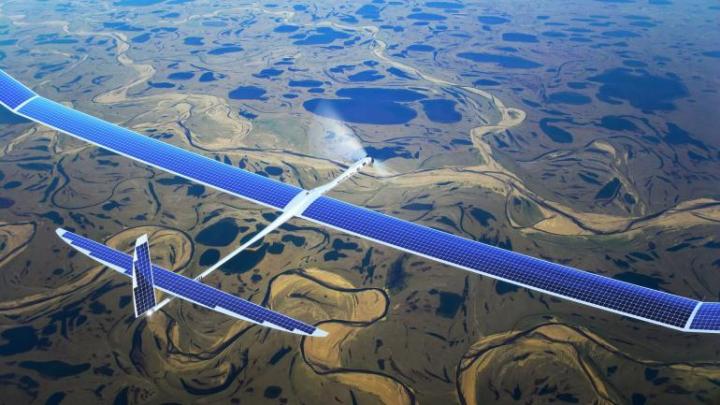
Adding to the already long list of companies Google has purchased in the past six months, news surfaced today that the search giant has acquired Titan Aerospace – a New Mexico-based company that specializes in high-altitude drones. News of the acquisition comes shortly after a similar purchase by Facebook, which acquired UK-based drone company, Ascenta, just last month.
For those of you who may be unaware, Google and Facebook are currently involved in an unofficial race to blanket the globe in cheap, omnipresent wireless Internet connectivity and bring online the remaining five billion people in the world who don’t have reliable Internet access. Both camps plan to create networks in Earth’s upper atmosphere with cheap aircraft, and thereby provide wireless web access to remote areas of the world without spending billions of dollars on infrastructure. They’re working toward the same goal, but in the early stages, the two companies had different approaches to how they would achieve it: Google planned on using high-altitude balloons to build the network, whereas Facebook opted to use drones.
In light of this recent acquisition, however, it seems that Google might be ditching the balloons and jumping on the drone bandwagon. Here’s our best guess as to why they switched gears:
Despite their sophistication, Google’s helium-filled balloons can only stay aloft for around 100 days, and can only handle a payload of a couple dozen pounds. They also aren’t particularly easy to maneuver, and rely on currents in the upper atmosphere to steer and change position. In contrast, Titan Aerospace’s Solara 60 UAV is a solar-powered aircraft that can stay aloft for up to five years at a time, is easy to maneuver, and can carry a payload of up to 250 pounds. In other words, they’re a bit more expensive, but high-altitude drones are much better suited for Google’s purposes.
Additionally, thanks to the increased payload capacities of the Titan drones, Google will be able to outfit them with better technology and use them for more than just network building. Speaking with the Wall Street Journal, a Google spokesperson mentioned that the drones might be used to provide high-quality images in real-time for Google Maps initiatives, which in turn could be used for things like disaster relief and addressing deforestation.
Bringing Internet access to five billion people across the globe, improving disaster relief, and fighting deforestation are all worthy pursuits; but don’t forget that the purpose of this project isn’t purely philanthropic. Google’s main goal here (and Facebook’s as well) is likely to spread the reach of it’s network, and ultimately gather more data from the new users it connects to the Internet. Five billion new Internet users is a whole lot of potential data, and Google wants a piece of that pie.



